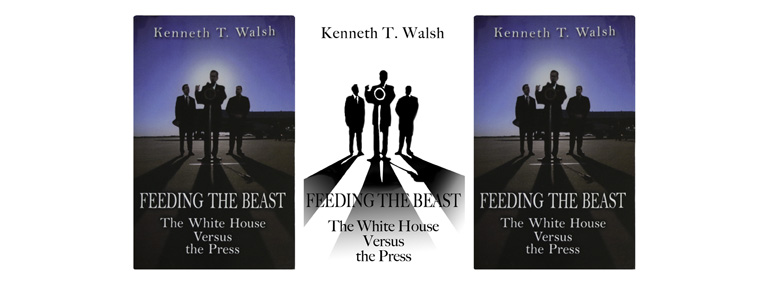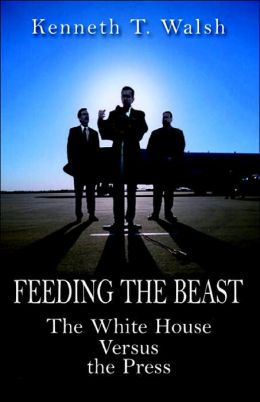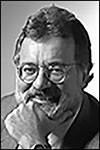by Kenneth T. Walsh
Avoiding single-minded laments on the shortcomings of the presidency or the failings of the press, Feeding the Beast is an evenhanded though often damning critique of the relationship between the White House and the news media, a relationship that can create more problems that it solves. For an informed electorate and an enlightened citizenry, few institutions are more important than the presidency and the mainstream media, and here Kenneth T. Walsh, a senior White House correspondent for U.S. News & World Report, candidly reports how ordinary citizens are the biggest losers in the current state of affairs. The widespread practice of "spin doctoring," the willingness on the part of the White House to mislead the press, overly interpretive reporting, and "gotcha" journalism do more to distort reality than illuminate it.
Walsh chronicles a passing parade of fascinating characters that have shaped our times and influenced our lives, while at the same time pulling back the curtain and laying bare many commonly held illusions. The connection between the White House and the press corps works well when the people involved interact well, and in shedding light on some of those relationships, Walsh relates his afternoon of pitching horseshoes with George Bush; Dan Quayle's previously undisclosed MTV gambit; and what it's like to interview Bill and Hillary Clinton; and he explains in fresh detail the ways Ronald Reagan was able to choreograph his presidency.



Published by Random House in 1996, updated in 2002
Publisher: Xlibris Corp - May 2002
ISBN-10: 1401050573
ISBN-13: 978-1401050573
Starting with George Washington, Walsh shows how Presidents and presidential candidates have repeated the same mistakes in dealing with the press from the beginning of the Republic. As the national media have grown over time into a voracious beast demanding to be fed, they have lost sight of their fundamental mission of presenting the world in a straightforward and comprehensible way to viewers, listeners, and readers. Too often, Walsh asserts, the press suffers from four basic flaws: injecting too much attitude into stories, assuming an overly negative approach to all news, rushing to judgment, and ignoring the values of Middle America. Walsh is able not only to point out the chronic problems, but also to examine how this crucial nexus for an involved electorate has become so contaminated that ordinary citizens no longer trust either the media or their elected officials.
FEEDING THE BEAST The White House Versus the Press

"The book reveals the great truth of the Washington press corps.
It is influenced not by liberal bias or corporate ownership so much as
by day-to-day coddling or inconvenience, flattery or rudeness."
-- The New York Times Book Review, David Brooks
FEEDING THE BEAST
BUY this book ...
Reviews
AMAZON Review
For 10 years, Kenneth T. Walsh worked the most glamorous beat in American journalism. The White House correspondent for U.S. News & World Report, he was a firsthand participant in the daily struggle for status and recognition waged by both the White House staff and the reporters themselves. It can be an odd task for journalists, who, having risen to the pinnacle of a very competitive profession, find themselves more or less at the mercy of arrogant--and often very young--staffers who serve as buffers between the press and executive branch of government.
AMAZON Review
Publishers Weekly
Despite the title and the book's gloss of press criticism, this is mostly a competent, conventional memoir of the past decade on the White House beat. U.S. News & World Report White House correspondent Walsh declares that the White House and the news media no longer trust each other, thus shortchanging the American public. He cites both manipulative politicos and the rise of journalists' cynicism and television's focus on personality. His anecdotal history of the Reagan, Bush and Clinton years is readable but strains for judgment: Did the run-up to the Gulf War really show the media on two sides, jingoists and antimilitarists? Was the press really unfair to Dan Quayle? Walsh's observations that the White House media focus too much on conflict, are tyrannized by the fast-running news cycle and are isolated from middle America have been made more eloquently in James Fallows's recent Breaking the News. Walsh's prescription, that reporters avoid editorializing or analysis, and that they get outside the Beltway, are only partial solutions.
Copyright 1996 Reed Business Information, Inc.
Library Journal
That serious conflict exists between government and news media is not a new idea; it has generated numeous books, scholarly studies, essays, and editorials in recent years. What distinguishes this volume by the White House correspondent for U.S. News and World Report is its thoroughness, its evenhandedness, and the author's willingness to chastise his colleagues: "If we do not mend our ways, within a decade there will be a rollback of our protections. Libel laws could be weakened ...access to information could be tightened to limit reporters' ability to ... investigate abuses in government." There's plenty of blame as well for a government that has lied to the public or has been incompetent in handling its press relations. Recommended especially for libraries with major contemporary political collections.
Chet Hagan, Berks Cty. P.L. Sys., Pa.
Copyright 1996 Reed Business Information, Inc.
Marlin Fitzwater
"Walsh knows the hand that feeds the press and offers wise insight into the strange relationship between Presidents and the press. If you watch or read the news, Feeding the Beast explains it all."
--Marlin Fitzwater,
press secretary to Presidents Ronald Reagan and George Bush
Kirkus Reviews
A veteran White House correspondent gives mixed reviews to his colleagues and the powerful people on his beat. There are several problems with Walsh's chronicle of his ten years covering the presidency for U.S. News and World Report. Walsh remains on the beat and has been careful not to burn all his bridges. The result is a curious mix of unqualified criticism of people with whom he no longer has to deal (such as former Bush chief of staff John Sununu, whom Walsh accuses of ``arrogance and condescension''), and excuses for the mistakes of sources still to be tapped (such as Hillary Clinton, blamed for much of the administration's mishandling of the press but forgiven as an ``increasingly poignant figure''). Another problem is the danger of swift obsolescence in books attempting to be entirely up-to-the- minute. The danger for Walsh is compounded because nearly half of the book is devoted to the still-evolving Clinton presidency. And Walsh rationalizes the behavior of his press colleagues even as he concedes that ``the media's cult of conflict and criticism has gone too far.'' But there is also much to recommend this book. Walsh is a good reporter who has the quotes and citations to support his thesis that presidents who feed the White House press corps (the ``beast'') will be rewarded in kind. He attributes Reagan's long honeymoon with the press to the nurturing given journalists by a savvy staff. Clinton, on the other hand, has been punished for surrounding himself with people who distrusted White House reporters and treated them shabbily. Walsh describes the immense role personalities play in shaping the portrait of the presidency presented to the American people, and many observers of the press will find his revelations interesting. But one suspects that this book will become required reading only at the White House, where it will prove useful as a manual for staffers on the care and feeding of the media beast.
-- Copyright ©1996, Kirkus Associates, LP. All rights reserved.
Published by Xlibris
From George Washington to George W. Bush, Presidents have always complained about the press - and the media have never been happy with the White House. Their uneasy but important relationship is the subject of Feeding the Beast: The White House Versus the Press. Kenneth T. Walsh, chief White House correspondent for U.S. News & World Report, draws on his more than 15 years covering the presidency in this incisive analysis. He reveals much inside information about the White House, with a special emphasis on the four Presidents he has covered - Geroge W. Bush, Bill Clinton, George Herbert Walker Bush, and Ronald Reagan. Walsh also delves into the history of the relationship from the beginning of the Republic, making his book all the more valuable not only to general readers but to students of the presidency and those who wish to understand today´s media world. Feeding the Beast concludes with a hard-hitting analysis of the contemporary news media and shows how the media have grown into a voracious beast demanding to be fed 24 hours a day. Too often, Walsh argues, the media suffer from four basic flaws: injecting too much attitude into their work; assuming an overly negative approach; rushing to judgment about people, events, and trends, and ignoring the values and concerns of Middle America.
Business Week - Douglas A. Harbrecht
THE GILDED SNAKE PIT
The White House beat produces a peculiar breed of journalist. To the public and the rest of the press, covering 1600 Pennsylvania Avenue looks like a cruise on Glamour Street, a pinnacle of the profession. Those there know better. In many respects, the beat is a gilded snake pit--hundreds of reporters crammed into a press room or kept in pens whenever the President travels. Walled off from officials, they fight for hours, sometimes days, for news scraps.
Such degradations take their toll. Indeed, the executive branch's press regulars are a surly, snarling bunch. Just ask Kenneth T. Walsh. The senior correspondent for U.S. News & World Report has covered the Presidency since 1986. He has written a chatty but thoughtful memoir of what the job really feels like. And despite its subject, Feeding the Beast: The White House Versus the Press is a pleasant beach read.
Walsh makes some trenchant points: He shows how the hostility that the Clintons and their top aides exhibited toward the press following the 1992 campaign has colored coverage ever since. President Clinton's problems with Whitewater, Filegate, and the character issue can be attributed to basic errors that ``amount to case studies on how not to handle the press,'' he writes. But Walsh also has some harsh words for his colleagues, charging that cynicism and shrillness crowd out quality journalism. It's a useful corrective for anyone who has ever fantasized about being a White House correspondent.
BY DOUGLAS A. HARBRECHT
Business Week Archives
BYLINE- Jack Kisling
THE DENVER POST
The appetite of the beast is bottomless
August 18, 1996
(Desktop version)
BYLINE - Philip Seib
DALLAS MORNING NEWS
White House nature tales; Politicos love the press, and cobras love mongooses, too
July 21, 1996
(Desktop version)
THOMAS W. HOWARD
Richmond Times Dispatch
D.C. PRESS GETS RAKED OVER COALS
August 18, 1996
(Desktop version)
BYLINE - A.B. Stoddard
THE HILL
REFLECTIONS FROM A
WHITE HOUSE CORRESPONDENT
June 19, 1996
(Desktop version)
BYLINE - Larry Bensky
LOS ANGELES TIMES
INSIDE THE BELLY OF THE BEAST
July 21, 1996
(Desktop version)
BYLINE - JEFFREY STINSON
Milwaukee Journal Sentinel
PRESIDENT AND
PRESS MISMANAGEMENT Clinton
failed to feed media beast
June 2, 1996
(Desktop version)
BYLINE - DANA PARSONS
The LOS ANGELES Times
INSIDER'S VIEW ON WHY
FEWER ARE PULLING FOR THE PRESS
May 19, 1996
(Desktop version)










